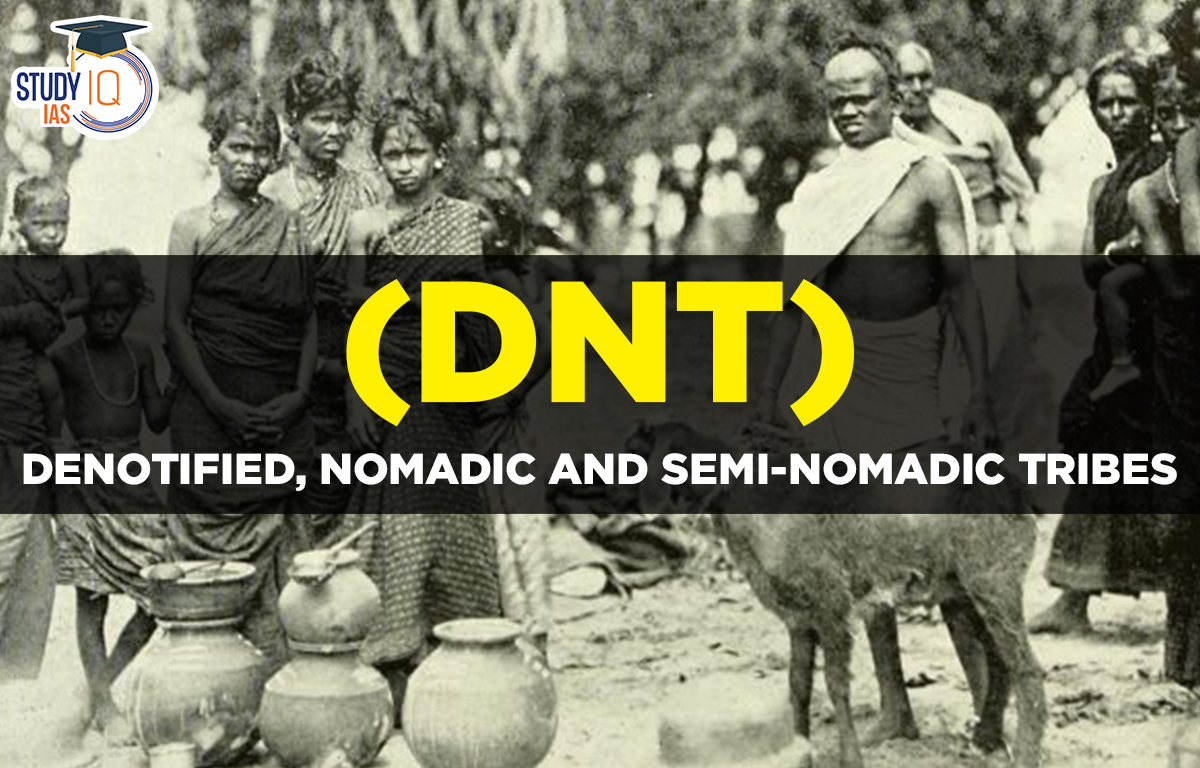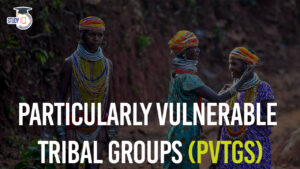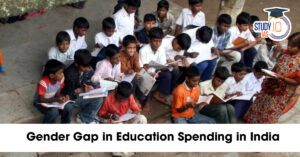Table of Contents
Context: Community leaders are demanding the establishment of a permanent National Commission for Denotified, Nomadic, and Semi-Nomadic Tribes (DNTs).
The Anthropological Survey of India (AnSI) and Tribal Research Institutes (TRI) have classified 268 denotified, semi-nomadic, and nomadic tribes for the first time.
Denotified, Nomadic, and Semi-Nomadic Tribes (DNTs)
- Denotified, Nomadic, and Semi-Nomadic Tribes (DNTs) are communities in India that were previously listed as criminal tribes under the British Raj.
-
- Denotified Tribes: Communities that were listed as “criminal tribes” under the British-era Criminal Tribes Acts (1871–1947) and later “de-notified” after the Acts were repealed in 1952.
- Nomadic Tribes: Social groups that historically practised seasonal or periodic migration as a livelihood strategy.
- Semi-Nomadic Tribes: Communities that move less frequently and over shorter distances compared to fully nomadic groups.
- The Union Government repealed the Criminal Tribes Act in 1952, removing the designation of “criminal” from these communities.
- A Special Committee was formed by the PMO in 2019. It was given the task of Ethnographic classification of DNTs. It was led by AnSI and Tribal Research Institutes (TRIs).
Key Previous Commissions related to DNT’s
- First Backward Classes Commission (1953) – Kaka Kalelkar
- Lokur Committee (1965)
- Mandal Commission (1980)
- Renke Commission (2008)
- Idate Commission (2017)
Status of DNTs in India
- Over 10 crore Indians belong to more than 1,400 DNT, Nomadic, or Semi-Nomadic communities.
- These groups are spread across various States and have distinct socio-economic challenges.
- Two important commissions were formed:
- Renke Commission (2008): To identify and list DNT communities.
- Idate Commission (2014): Tasked with creating a State-wise list and recommending welfare measures. Tenure: 3 years.
- Many DNTs fall under SC, ST, or OBC categories but still face exclusion from mainstream welfare schemes.
Key Findings of the Study
- Total Communities Studied: 268 denotified, semi-nomadic, and nomadic tribes were comprehensively categorised for the first time.
- Inclusion in SC/ST/OBC Lists: 179 communities recommended for inclusion in Scheduled Castes (SC), Scheduled Tribes (ST), and Other Backwards Classes (OBC) lists.
- First-Time Classification: 85 communities were recommended for classification for the first time ever.
- Missing Communities: 63 communities were found to be “not traceable” due to possible assimilation, name changes, or migration.
Need for Categorization
- The Parliamentary Standing Committee on Social Justice and Empowerment stressed the urgency of categorizing these communities for better welfare access.
- Misclassification in previous censuses has led to confusion regarding tribes and castes.
- Some communities remain unclassified, making it difficult for them to avail themselves of welfare schemes.
About De-Notified, Nomadic and Semi-Nomadic Tribes (DNT)
- They are the most neglected, marginalised and economically and socially deprived communities.
- DNTs were “notified” as “born criminals” during the British era by several legislation, beginning with the Criminal Tribes Act of 1871.
- Even after independence, they somehow escaped the attention of our development framework and thus are deprived of support, unlike Scheduled Castes and Scheduled Tribes.
- Most of them have been living a life of destitution for generations, and still continue to do so with an uncertain and gloomy future.
- Numerical Strength: More than 10 crore Indians from over 1,400 communities are denotified, nomadic or semi-nomadic.
- Idate Commission had categorised 1,262 communities under SC/ST/OBC lists and 267 communities were left uncategorised.
- However, communities categorised by the Idate Commission are not accurate with many communities appearing in the SC list in one State or district and on the ST list in others.
Steps Taken for Upliftment of DNT
SEED (Scheme for Economic Empowerment of DNTs)
- It was launched by the Union Ministry of Social Justice and Empowerment.
- Aim: Providing free competitive exam coaching, health insurance, housing assistance, and livelihood initiatives.
- An amount of Rs 200 crore has been allocated for this scheme, to be spent over five years from FY2021-22 to FY2025-26.
Four Components
- To provide coaching of good quality for DNT candidates to enable them to appear in competitive examinations.
- To provide Health Insurance to them.
- To facilitate livelihood initiatives at the community level, and
- To provide financial assistance for the construction of houses for members of these communities.
National Commission for Denotified Nomadic and Semi-Nomadic Tribes (NCDNSNT)
- It is a national commission set up under the Ministry of Social Justice and Empowerment.
- The commission was appointed to study various developmental aspects of Denotified and nomadic or semi-nomadic tribes in India.
- The Commission was first set up on 22 November 2003 and reconstituted on 16 March 2005.
Development and Welfare Board for De-notified, Nomadic and Semi-Nomadic Communities (DWBDNC)
- It was constituted in February 2014 to prepare a state-wise list, which submitted its report in 2018, identifying 1,262 communities as de-notified, nomadic and semi-nomadic.
- DWBDNC was established under the Societies Registration Act, 1860, under the aegis of the Ministry of Social Justice and Empowerment to implement welfare programmes.
- The DWBDNC was constituted on 21st February 2019, under the chairmanship of Bhiku Ramji Idate.
Schemes for DNTs by the Ministry of Social Justice and Empowerment
Ambedkar Pre-Matric and Post-Matric Scholarship for DNTs
- Launched: 2014-15 (Centrally Sponsored Scheme)
- Target: DNT students not covered under SC/ST/OBC
- Eligibility: Parental income ≤ ₹2 lakh per annum
- Implementation: Through States/UTs; cost sharing 75:25 (Centre: State)
Scholarship Rates
- Pre-Matric:
- Class I–VIII: ₹1000/year (10 months)
- Class IX–X: ₹1500/year (10 months)
- Post-Matric:
- Hostellers: ₹380–₹1000
- Day Scholars: ₹230–₹550
Nanaji Deshmukh Scheme of Construction of Hostels for DNTs
- Launched: 2014-15 (Centrally Sponsored)
- Target: DNT students (not SC/ST/OBC) pursuing higher education
- Eligibility: Parental income ≤ ₹2 lakh per annum
- Implementation: Through States/UTs/Central Universities
- Support: Up to 500 hostel seats/year nationwide
- Cost Norm: ₹3 lakh per seat + ₹5,000 for furniture
- Funding Pattern: 75:25 (Centre: State)


 Particularly Vulnerable Tribal Groups (P...
Particularly Vulnerable Tribal Groups (P...
 Geo-tagging of Buildings During Upcoming...
Geo-tagging of Buildings During Upcoming...
 Gender Gap in Educational Expenditure in...
Gender Gap in Educational Expenditure in...

























